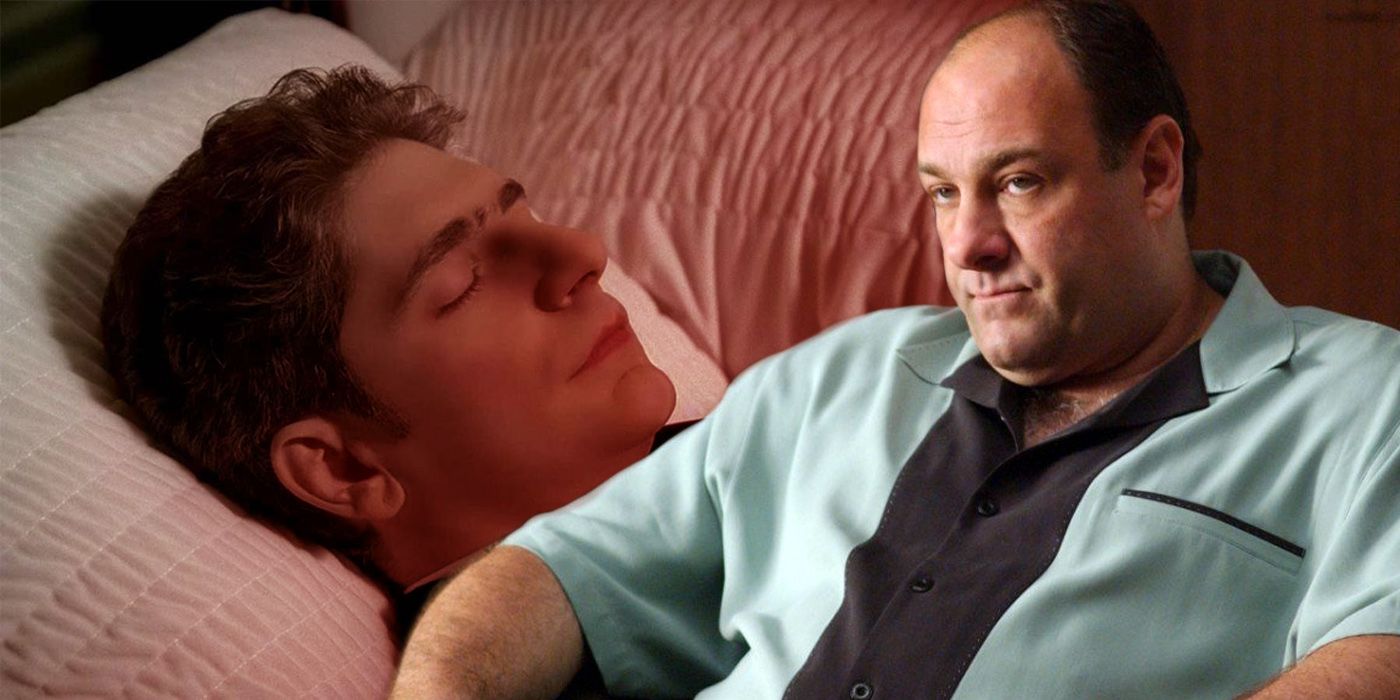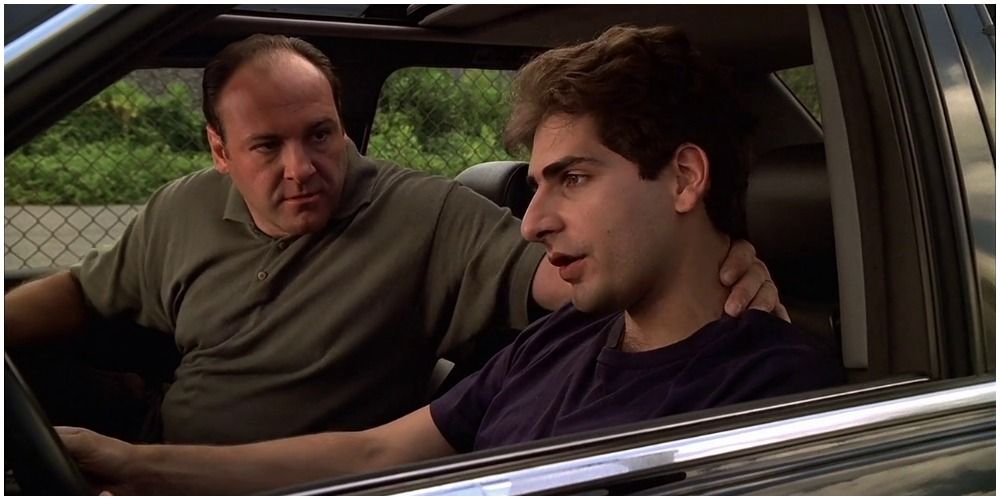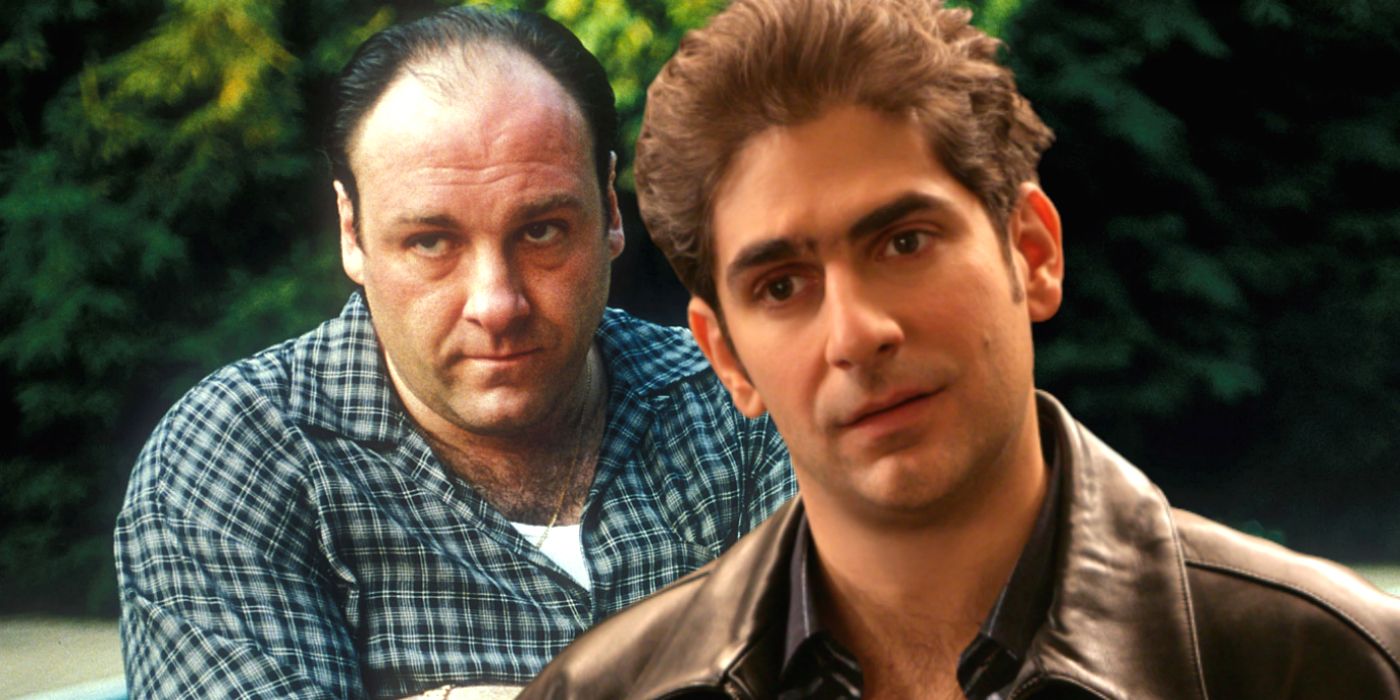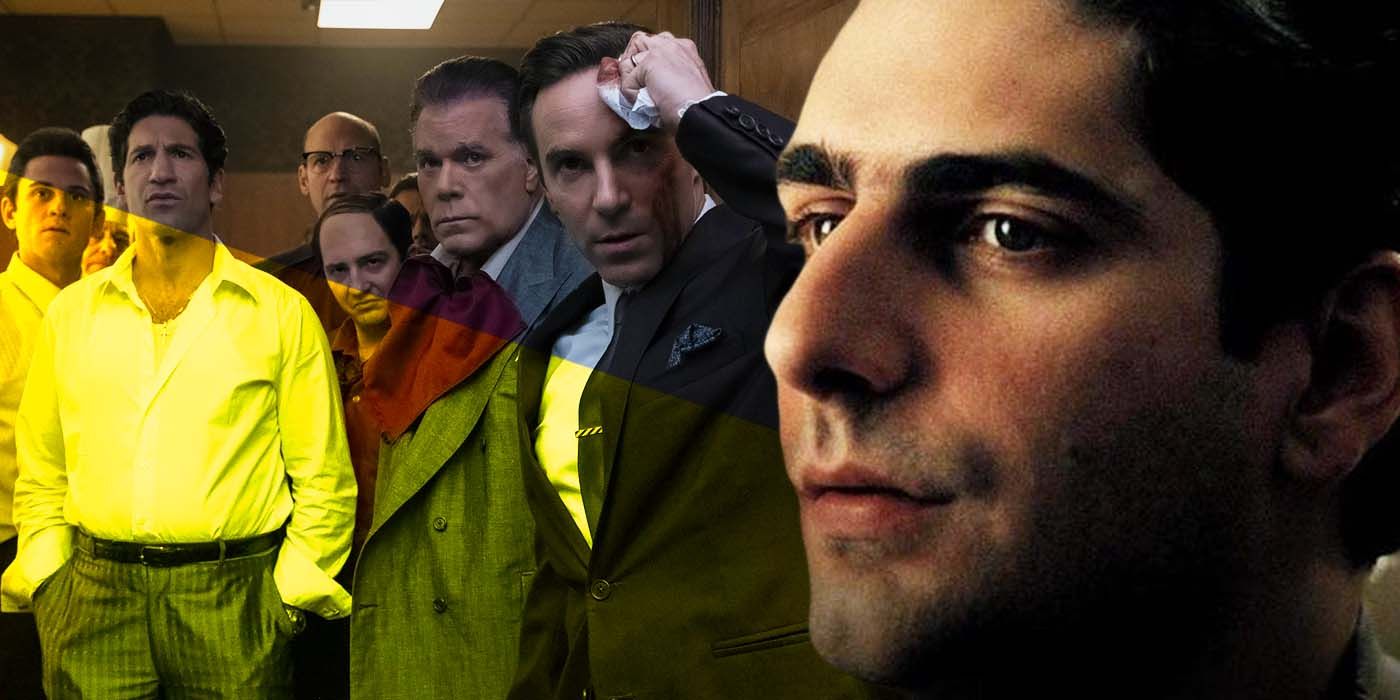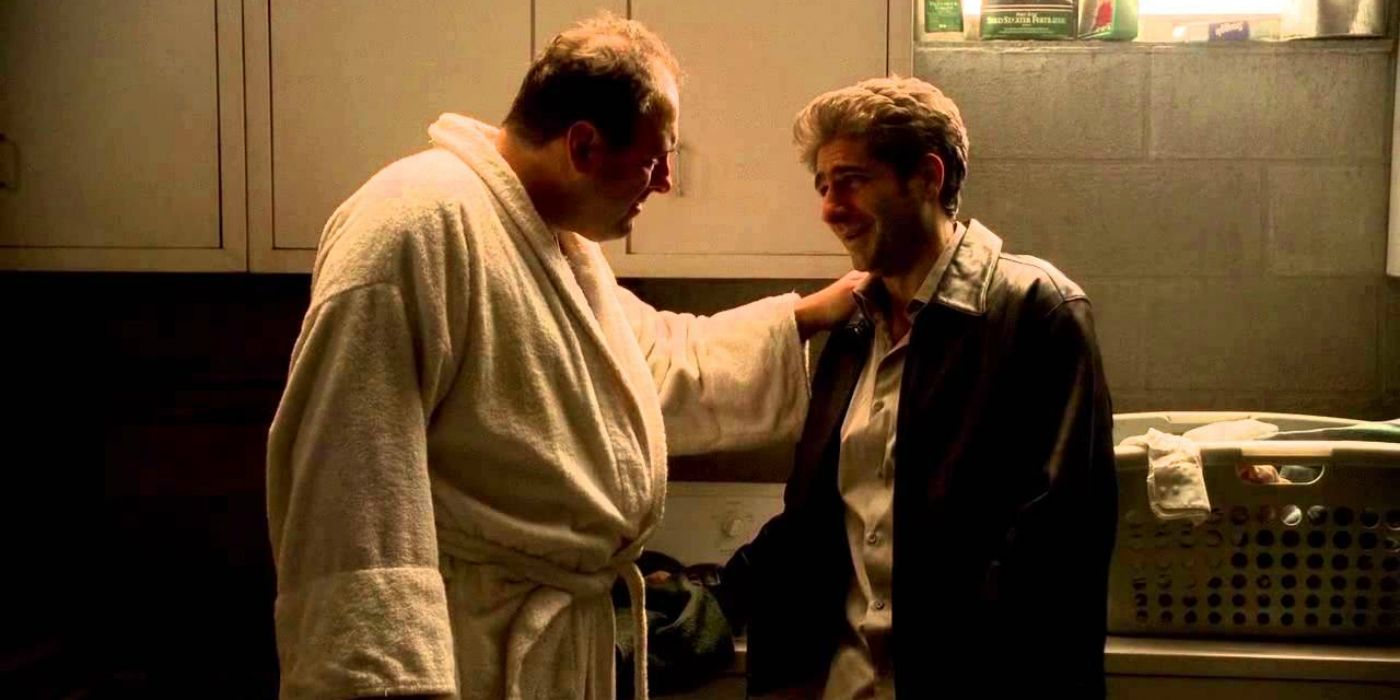Tony Soprano murdering Christopher Moltisanti in The Sopranos was one of its most shocking moments. Despite it being years since The Sopranos season 6 aired in 2006, there are still many questions about the Chris Moltisanti death scene — the biggest being why exactly did Tony kill Christopher? In one of The Sopranos‘ final episodes, “Walk Like a Man,” the long-time friends joke around with each other and appear to be on good terms, despite some conflict to resolve with Paulie. However, the inherent vices of the underworld soon catch up with Christopher Moltisanti, which leads to the season 6 episode “Kennedy and Heidi” when Tony Soprano kills Chris.
Despite Chris being Tony’s nephew in a complex roundabout way, The Sopranos didn’t make the full reasons for Tony murdering Chris clear. However, the background of Tony Soprano and Christopher Moltisanti’s relationship is revealed in The Many Saints of Newark, HBO’s Sopranos prequel movie. Moreover, Christopher narrates The Many Saints of Newark as a disembodied voice from hell. Although The Many Saints of Newark is focused on Dickie Moltisanti and a teenaged Tony Soprano, Christopher Moltisanti’s death in Sopranos season 6 haunts the DiMeo crime family even in the past. Here’s the truth about why Tony killed him.
How The Sopranos Explained Why Tony Killed Christopher
While Tony killing Chris in The Sopranos was a shock to viewers when the episode aired in 2006, the show had dropped subtle hints about Chris Moltisanti’s murder. Christopher Moltisanti’s death, years before Christopher narrates The Many Saints of Newark, was thematically foreshadowed in “Walk Like a Man” through Tony’s interactions with his son A.J. (Robert Iler) and Dr. Melfi. While they initially seem unrelated, they reveal a great deal about Tony Soprano’s worldview and outlook at the time, which by extension explain why he killed Chris.
Chris Moltisanti wasn’t killed by Tony as part of a mob hit, but because of what Christopher represented in regard to Tony’s son, A.J, and where Tony was on his journey as a parent. After a break-up, A.J. becomes severely depressed and shows suicidal behavior, at least according to his sister Meadow (Jamie-Lynn DiScala). Tony subsequently tells Dr. Melfi that he’s done with therapy, and calls the sessions “a jerk-off.” He references his failures as a parent, and how he has passed “rotten” genes to his son. Meanwhile, Tony anticipates yet another Christopher meltdown after he throws Paulie’s nephew through a window.
Importantly, though, Tony doesn’t realize that Christopher is no longer sober. These are all factors that build to a fateful car accident involving Tony and Christopher, with the latter admitting that he’s unable to pass a drug test, one of the final straws for Tony Soprano and Christopher Moltisanti’s relationship. Although Tony can never change what he genetically passed on to A.J., he can prevent Christopher from destroying lives other than his own. Christopher’s life is worth saving, of course, but Tony’s subconscious guilt takes over, and he squeezes Christopher’s nostrils until he dies.
Tony Soprano Saw Killing Christopher As Merciful
The Sopranos didn’t also explain Tony’s reason for killing Chris through the plot elsewhere, but also through the soundtrack. Although the moment was shocking, Tony’s motivations in The Sopranos presciently link to a song that plays before the accident, with Christopher referencing The Departed soundtrack and playing Pink Floyd’s “Comfortably Numb.” In Martin Scorsese’s 2006 film, the track plays as Leonardo DiCaprio’s Billy Costigan spirals out of control during an undercover investigation and contemplates suicide.
As Tony and Christopher drive, “Kennedy and Heidi” plays, with the lyric “the dream is gone” underlining the central message of the scene and foreshadowing Tony’s subsequent actions as the mob boss kills his underworld son to save him from a more tragic death. Prophetically, David Chase shows audiences that in Christopher Moltisanti’s final moments, he isn’t terrified but rather “comfortably numb.” As Tony and Christopher’s relationship comes to a bittersweet end, there is a faint sense of acceptance – and even relief – from both characters.
Delving further into this scene, it is apparent that this pivotal Christopher Sopranos moment stems from many additional factors. Considering Tony’s position in the DiMeo crime family, Tony needs to be absolutely convinced that someone like Christopher won’t spiral out of control and reveal information about their organization. Tony does trust his protege to a certain extent and loves him like a son.
Unfortunately for Christopher, though, he’s simply gone too far this time by driving under the influence with Tony in the passenger seat. After the accident, Tony sees a crushed baby seat and seemingly thinks about his own children, forcing Tony to take control, because he can, and essentially choose one family over another by killing Christopher (who, tellingly, isn’t his direct blood relative). A few episodes later, The Sopranos ends with a cryptic cut to black. Despite this lack of absolute clarity, what’s important is who Tony is with: his wife, his daughter, his son, the family Tony ultimately chooses.
Christopher’s The Many Saints Of Newark Narrator Role Adds Weight To His Death
The Sopranos’ backstory is revealed in the prequel movie The Many Saints of Newark, and Christopher narrates Many Saints of Newark to further establish the impact of not just Christopher’s death, but also Tony Soprano and Christopher Moltisanti’s relationship on the DiMeo crime family. Christopher’s narration begins during the opening sequence showing his tombstone, during which he provides context for the movie’s title by explaining that Moltisanti is a religious name that literally means “many saints.” Notably, Sopranos-era Christopher’s disembodied voice functions as the narrator to continue the series’ long tradition of using elements of mysticism and magic to punctuate crucial points in the lives of the DiMeo crime family members.
After the opening sequence, every scene Christopher narrates in the Sopranos prequel involves a key point in young Tony Soprano’s life. This includes Christopher talking about important DiMeo crime family players as Dickie and Tony pick up Dickie’s father Dick Moltisanti (Ray Liotta), where Christopher also introduces Tony, “The little fat kid is my uncle, Tony Soprano… He choked me to death.” Sopranos-era Christopher also narrates the movie’s time jump from the ’60s to the ’70s, the scene where Tony moves to the suburbs, and, most notably, Dickie’s funeral.
As Tony looks upon the corpse of his recently deceased uncle and mentor, Dickie’s hand moves up to make a pinky promise with his nephew while The Sopranos theme song fades in — a sign of Tony’s dedication to Dickie and the DiMeo family. With the camera focused on Tony’s face, Christopher narrates, “That’s the guy, my uncle Tony. The guy I went to hell for,” before the end credits roll. Christopher’s supernatural presence in Many Saints of Newark reveals how Christopher’s spirit views his death. While Christopher’s last line seems acerbic, there’s no bitterness or anger in his voice when he says the line, implying that Christopher understands how Tony did what he had to do for the family.
Christopher Moltisanti Got What Was Coming To Him
Christopher Moltisanti’s death, in hindsight, was well-deserved. In the end, just like how Tony regards Dickie, Christopher can’t help but look up to Tony, even when he’s viewing his uncle, mentor, and father figure from hell. However, all three got what was coming to them, especially Christopher. Throughout The Sopranos, Christopher killed nine people, most notably Emil Kolar (his first kill) and J.T. Dolan (his last).
However, what truly makes Christopher’s final The Sopranos moment so justified is how Christopher Moltisanti, while high on heroin, sat on a dog and killed it. What’s worse is that even this wasn’t enough of a signal for Christopher to stop using. Just as Tony Soprano was haunted by dreams of the murders and wrongdoings he committed, karma eventually caught up to Christopher Moltisanti, and his death was simply reaping what he’d sewn throughout his life.

